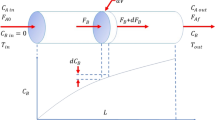Abstract
This paper deals with the optimal feedback control problem for the modified Kelvin-Voigt model. The considered model describes the motion of weakly concentrated aqueous polymer solutions. In our case, the control function (the external force) depends on the velocity of the fluid. In such a way, the control is not selected from a finite set of available controls, but belongs to the image of some multi-valued map. The solution for the control problem of fluid motion is a pair: the velocity of the fluid and the control (the density of external forces). Since there can be many such pairs, the concept of optimal solution naturally arises, which gives a minimum to specified cost functional. For the considered optimal feedback control problem the existence theorem on weak solution is proved.
Similar content being viewed by others
References
Filippov AF. On certain questions in the theory of optimal control. J Soc Ind Appl Math Ser A Control 1962;1(1):76–84.
Aubin JP, Cellina A. Differential Inclusion. Berlin: Springer-Verlag; 1984.
Kamenskii M, Obukhovskii V, Zecca P. Condensing multivalued maps and semilinear differential inclusions in banach spaces. Berlin-New York: Walter de Gruyter; 2001.
Obukhovskii VV, Zecca P, Zvyagin VG. Optimal feedback control in the problem of the motion of a viscoelastic fluid. Topological Methods Nonlinear Anal 2004;23:323–37.
Zvyagin VG, Zvyagin AV, Turbin MV. Optimal feedback control problem for the Bingham model with periodical boundary conditions on spatial variables. J Math Sci 2020;244:959–80.
Zvyagin VG, Turbin MV. Optimal feedback control in the mathematical model of low concentrated agueous polymer solutions. J Optim Theory Appl 2011; 148(1):146–63.
Zvyagin VG, Turbin MV. The study of initial-boundary value problems for mathematical models of the motion of Kelvin–Voigt fluids. J Math Sci 2010; 168(2):157–308.
Plotnikov PI, Turbin MV, Ustiuzhaninova AS. Existence theorem for a weak solution of the optimal feedback control problem for the modified Kelvin-Voigt model of weakly concentrated aqueous polymer solutions. Dokl Math 2019; 100(2):433–5.
Pavlovsky VA. On theoretical description of weak aqueous solutions of polymers. Dokl Akad Nauk SSSR 1971;200(4):809–12. (in Russian).
Oskolkov AP. Some quasilinear systems that arise in the study of the motion of viscous fluids. Zapiski Naucnyh Seminarov Leningradskogo Otdelenija Matematiceskogo Instituta im. V A Steklova Akad Nauk SSSR (LOMI) 1975;52:128–57. (in Russian).
Turbin MV, Ustiuzhaninova AS. The existence theorem for a weak solution to initial-boundary value problem for system of equations describing the motion of weak aqueous polymer solutions. Russian Mathematics 2019;63(8):54–69. https://doi.org/10.3103/S1066369X19080061.
Kaya M, Celebi AO. Existence of weak solutions of the g-Kelvin-Voight equation. Math Comput Model 2009;49:497–504.
Antontsev SN, Khompysh K h. Kelvin-Voight equation with p-Laplacian and damping term: Existence, uniqueness and blow-up. J Math Anal Appl 2017; 446(2):1255–73.
Kalantarov VK. Attractors for some nonlinear problems of mathematical physics. Zapiski Naucnyh Seminarov Leningradskogo Otdelenija Matematiceskogo Instituta im. V A Steklova Akad Nauk SSSR (LOMI) 1986;152:50–54. (in Russian).
Kalantarov VK, Titi ES. 2007. Global attractors and estimates of the number of degrees of determining modes for the 3D Navier-Stokes-Voight equations.arXiv:0705.3972v1.
Kalantarov VK, Levant B, Titi ES. Gevrey regularity for the attractor of the 3D Navier-Stokes-Voight equations. J Nonlinear Sci 2009;19:133–52.
Temam R. Navier-stokes equations, theory and numerical analysis. Rhode Island: AMS Chelsea Providence; 2000.
Ladyzhenskaya OA. The mathematical theory of viscous incompressible flow. New York: Gordon and Breach Science Publishers; 1969.
Solonnikov VA. Estimates of Green’s tensors for some boundary-value problems. DAN SSSR 1960;130(5):988–91.
Vorovich II, Yudovich VI. Steady flow of a viscous incompressible fluid. Mat Sb 1961;53(4):393–428.
Fursikov AV. Optimal control of distributed systems. Theory and applications. Trans. of math. monographs, AMS Providence, vol 187; 2000.
Simon J. Compact sets in the space Lp, (0,T; B). Annali di Matematica 1986;146:65–96.
Funding
The research of the first author (Theorem 1 on the existence of a weak solution for the feedback control problem) was supported by the Russian Foundation for Basic Research, project no. 20-01-00051. The research of the second author (Theorem 2 on the existence of a solution minimizing the given cost functional) was supported by the Russian Science Foundation, project no. 19-11-00146.
Author information
Authors and Affiliations
Corresponding author
Ethics declarations
Conflict of Interest
The authors declare that they have no conflict of interest.
Additional information
Publisher’s Note
Springer Nature remains neutral with regard to jurisdictional claims in published maps and institutional affiliations.
Rights and permissions
About this article
Cite this article
Ustiuzhaninova, A., Turbin, M. Feedback Control Problem for Modified Kelvin-Voigt Model. J Dyn Control Syst 28, 465–480 (2022). https://doi.org/10.1007/s10883-021-09539-0
Received:
Revised:
Accepted:
Published:
Issue Date:
DOI: https://doi.org/10.1007/s10883-021-09539-0
Keywords
- Feedback control
- Control problem
- Modified Kelvin-Voigt model
- Weak solution
- Multi-valued map
- Existence theorem



